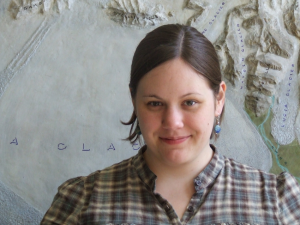50 scientists warn official predictions don’t include a feed-back as large as all U.S. emissions: the warming soil. From the Netherlands, Dr. Thomas Crowther. From Maine, paleobiologist Dr. Jacquelyn Gill says abrupt climate change hit species before us. We’re next.
In this program, we’ll talk about how creatures fell into extinction during abrupt climate shifts, sometimes within a single human lifetime. Paeloecologist Jaquelyn Gill joins us.
“About a thousand years later it was also very abrupt. So within less than a century several degrees Celsius warming, which is what we’re looking at in the next century – today. These very quick events were very shocking scientists a few decades ago when we first discovered just how quickly the climate system could shift like that.”
– Dr. Jacquelyn Gill
But first, some of the most shocking science yet. From the Netherlands, Dr. Thomas Crowther speaks for a team of 50 world scientists all warning the official climate projections are missing an important carbon feed-back. As we warm, the soil will release carbon dioxide and methane equivalent to the greenhouse gas emissions of the United States.
“We estimated that the carbon emissions from the soil are going to be approximately equivalent to 17 percent of current anthropogenic emissions. So every year, humans will emit a certain amount, and then the soil will be responsible for an extra 17%. Whereas at the moment, the U.S. is also 17% of the total anthropogenic emissions. So it’s really on that same order of magnitude: every year the soils will emit about an equivalent amount of carbon that we expect to be emitted from the US.”
– Dr. Thomas Crowther on Radio Ecoshock
Go ahead and deny it. Appoint all the climate deniers to the top levels of government. Command the rising tides to stop, and say it isn’t happening. Nature and the geophysical reality of this planet don’t care. The atmosphere, the seas and soil are shifting to a new reality. That’s the super-Tweet rocketing around the world, and all the President’s men can’t stop it.
I’m Alex Smith, and this is Radio Ecoshock.
Download or listen to this program in CD Quality (56 MB) or Lo-Fi (14 MB)
THOMAS CROWTHER – THE GREENHOUSE GASES THEY DON’T COUNT
For a couple of decades, I’ve heard scientists worry that warming the world will speed up micro-organisms that break down carbon. That could release more greenhouse gases into the atmosphere. But is it true? How can we test that? Scientists in different countries have been trying to simulate a warmer world, to see what happens to plants, and to the soil.
Now a team of dozens of scientists have released a summary of those studies. It looks like added carbon from the soil alone adds a whole new need for us to cut human emissions quickly, and as Donald Trump would say, “bigly”.
We’ve reached the lead author for this Letter published in the journal Nature, with 49 other scientists. It was published on December 1st, 2016. Dr. Thomas Crowther has been a Postdoctoral fellow, funded by the Yale Climate & Energy Institute. Now he’s at the Netherlands Institute of Ecology. He’s an expert in soil organisms, and extends his study to the process of climate change.

You can find this scientific paper “Quantifying global soil carbon losses in response to warming” abstract here, or here in the full text.
The key conclusion says scientists have found “empirical support” that rising temperature can stimulate carbon loss from the soil that “could accelerate planetary warming over the twenty-first century.”
As our guest points out, this large feedback has been left out of the large-scale models that create projections of warming. That means experts advising governments, and the Intergovernmental Panel on Climate Change, have lower estimates of developing global warming than reality.
Download or listen now to this Radio Ecoshock interview with Thomas Crowther in CD Quality or Lo-Fi
As always, Chris Mooney of the Washington Post has an excellent article about the importance (and limitations) of this new study: “Ground beneath our feet is poised to make global warming much worse, scientists find.”
Here’s another article, this time from Yale University press. Plus this from Robert Scribbler’s Blog.
JACQUELYN GILL – EXTINCTION THEN AND NOW
If we knew how species changed in the past, maybe we could help our current living companions survive. Of course, we need to know how plants and animals react to a climate shift. That’s part of what Jacquelyn Gill does. At the University of Maine, Dr. Gill is a a paleoecologist and biogeographer. We’ll find out what those terms mean, and hopefully get a glimpse of how things go extinct, just in case we need to know ourselves.

Officially, Jacquelyn Gill is an assistant professor with the University of Maine School of Biology and Ecology, and the Climate Change Institute. She’s co-authored and been lead author of a series of papers that are redefining how we think about conservation, in a time of climate change. A few of those new tools and visions seem a bit scary to me.
Download or listen now to this 28 minute interview with Jacquelyn Gill in CD Quality or Lo-Fi
We talk about the “BEAST Lab”, and the amazing fact that woolly mammoths did not go extinct until relatively recently. Jacquelyn says there were still some smaller sized mammoths near the Arctic, at the same time the pyramids were being built in Egypt. We just missed them (and there is a project to re-create a mammoth from DNA…)
You should check out Jacquelyn’s blog “The Contemplative Mammoth.” Her web site is here.
OK, now for the scary part. My take is that deep biologists realize we can’t save all the species, and maybe can’t even save many of them, as the climate shifts. So many species won’t have the capability to move, the time to adapt, the skills to find new food or shelter. So the experts are now considering a kind of triage, where triage is the process of judging the most important pillar species of the ecosphere, and working to save them first. That may leave others to die, but we have very limited resources for conservation biology (and even that may shrink under Donald Trump).
To dive deeper into this harsh reality, check out this founding paper, published in Conservation Biology in April 2015. The title is “The theory behind, and the challenges of, conserving nature’s stage in a time of rapid change”. The lead author is Joshua J. Lawler, with Jacquelyn as one of the co-authors. Find the abstract here, or the full text here.
Here is an article in Rolling Stone you may also want to check out: The Point of No Return: Climate Change Nightmares Are Already Here. There’s also this article all about Jacquelyn from the University of Maine.
FYI, you can find a description of climate shifts during recent ice ages here.
By the way, Jacquelyn’s 2009 paper won the 2010 William Skinner Cooper Award from the Ecological Society of America, given to honor an “outstanding contributor to the fields of geobotany, physiographic ecology, plant succession or the disturbance of plants along environmental gradients.” The title of that paper, as published in the journal Science is: “Pleistocene megafaunal collapse, novel plant communities, and enhanced fire regimes in North America.”
So we’ve talked with one of the younger leading lights of both the past and the future for species on this planet. Thanks for sharing with us Jacquelyn!
ARE WE ENTERING THE NEW AGE OF CLIMATE “ENDARKENMENT”?
It sounds like our best scientists will need outlets like Radio Ecoshock more than ever. According to an article at politico.com, published December 9, quote:
“Donald Trump’s transition team wants the Energy Department to provide the names of any employees who have worked on President Barack Obama’s climate initiatives — a request that has current and former staffers fearing an oncoming ‘witch hunt.‘”
That’s on top of the Trump teams threats to cut two billion dollars in climate research at NASA. Welcome to the new dark age, where the religion of money trumps reality.
Thank you for listening to Radio Ecoshock, where I’ll continue to pump out climate science direct from the sources, as long as my brain and breath continue.
I’m Alex Smith. Please tell your friends, and anyone who will listen, about this program – and join us again next week for more.
In the show I played my new song “Once You Know the Future”. You can listen, download or share it at Soundcloud.com.
McPherson noted that only small burrowing mammals could survive in the hotter regimes that have dominated our planet’s past. A 4C rise above our baseline that we depend on would leave larger mammals unable to thermo regulate over the majority of the planet for significant periods each year. We may be doomed. What do you think?
you aware of roger angel’s work at ua to create a non-toxic, reversible, space-based sunshade to overcome global warming that will be or already is past the tipping point?
google: roger angel lagrangian
or go to:
http://www.pnas.org/content/103/46/17184.full
this is a 20+ year program with a multi-trillion pricetage
move species and humans towards poles. Expect voluntary or involuntary population reduction. Oppose racist anti immigration politicians in Europe and US.